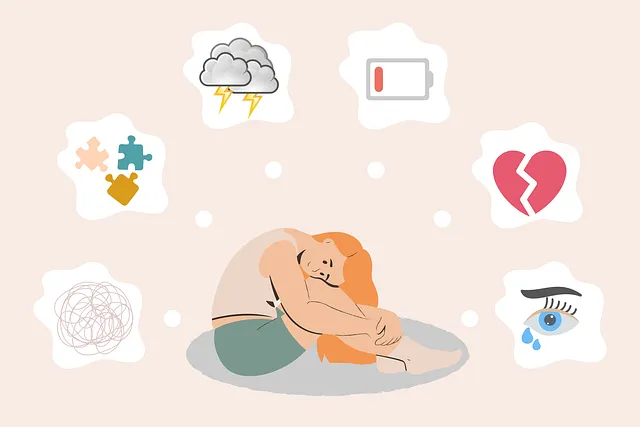Westminster does Kaiser cover mental health therapy? Yes, through their collaboration emphasizing accessible therapeutic services with compassion cultivation practices. These practices promote positive thinking by enhancing coping skills and mental resilience, leading to improved life satisfaction. Incorporating daily positive thinking exercises like journaling or mindfulness meditation significantly benefits mental well-being, reducing anxiety, depression, and stress. Westminster and Kaiser's coverage ensures culturally sensitive care, helping individuals overcome challenges and maintain consistent positivity in a fast-paced world.
Positive thinking exercises are gaining prominence as effective tools for enhancing mental well-being, with programs like those offered by Kaiser and Westminster leading the way in accessible mental health care. This article explores the transformative potential of positive thinking, offering a comprehensive guide to implementation. We’ll uncover evidence-based practices to integrate into daily routines, backed by scientific insights into its benefits. Additionally, we provide strategies for consistent engagement, ensuring readers can overcome challenges and reap lasting rewards from this empowering approach.
- Understanding Mental Health and Therapy: The Kaiser-Westminster Connection
- Unlocking the Power of Positive Thinking: A Comprehensive Approach
- Implementing Positive Thinking Exercises in Everyday Life
- The Benefits of Regular Practice: Scientific Insights
- Overcoming Challenges: Tips for Consistent Engagement
Understanding Mental Health and Therapy: The Kaiser-Westminster Connection

Mental health is a crucial aspect of overall well-being, and therapy plays a significant role in supporting individuals in managing their mental health challenges. When considering Westminster does Kaiser cover mental health therapy, it’s essential to understand that many insurance plans, including Kaiser, offer comprehensive coverage for various therapeutic services. This accessibility is vital for fostering coping skills development and promoting positive thinking.
The connection between Kaiser and Westminster in this context highlights the availability of diverse treatment options. Compassion cultivation practices, a key component of many therapy modalities, can be incredibly effective in enhancing one’s ability to cope with stress, anxiety, and other mental health issues. By understanding and leveraging these therapeutic tools, individuals can embark on a journey towards improved mental resilience and overall life satisfaction, which is at the heart of positive thinking exercises.
Unlocking the Power of Positive Thinking: A Comprehensive Approach

Positive thinking is a powerful tool that can transform lives and create a more optimistic outlook on life’s challenges. It involves shifting one’s mindset to focus on the positive aspects, fostering hope and resilience in the face of adversity. This comprehensive approach to well-being is not merely a superficial practice but a structured method that enhances emotional regulation. By cultivating positive thoughts, individuals can improve their mental health and overall quality of life, which is particularly relevant in today’s fast-paced world.
In the context of mental health therapy, Westminster does Kaiser cover these essential aspects. The implementation of positive thinking exercises can be a game-changer for both clients and therapists. Effective communication strategies, as highlighted in risk management planning for mental health professionals, play a pivotal role in guiding individuals towards this mindset shift. These strategies facilitate open dialogue, ensuring that the therapeutic process is inclusive and beneficial for all involved, ultimately empowering folks to take control of their mental well-being.
Implementing Positive Thinking Exercises in Everyday Life

Incorporating positive thinking exercises into your daily routine can significantly enhance your mental well-being. These practices, often encouraged by professionals like those at Kaiser (including Westminster plans), are integral parts of emotional healing processes aimed at improving Mental Health Awareness. Start with simple activities such as journaling—a powerful tool to reflect on and reframe negative thoughts. Each day, set aside time to write down three positive aspects of your life or experiences that brought you joy. This exercise encourages mindfulness and helps train your mind to recognize and focus on the positives, fostering a more optimistic outlook.
Additionally, engaging in activities that promote relaxation and stress reduction, like meditation or deep breathing exercises, can be transformative. These techniques are not just beneficial for mental health; they also contribute to improving social skills training by enhancing emotional regulation, enabling better interactions with others. Whether it’s through structured programs or personal exploration, consistently practicing these positive thinking strategies will eventually become second nature, profoundly impacting your overall quality of life.
The Benefits of Regular Practice: Scientific Insights

Regular practice of positive thinking exercises has been shown to have profound effects on mental health and overall well-being. Scientific studies highlight that cultivating optimism and reframing negative thoughts can significantly reduce symptoms of anxiety, depression, and stress. This is particularly relevant in today’s fast-paced world where individuals often face numerous challenges that can impact their mental resilience. By regularly engaging in such exercises, people can enhance their emotional regulation capabilities, fostering a sense of calm and resilience in the face of adversity.
Westminster does Kaiser cover mental health therapy? Yes, many insurance plans, including Kaiser, offer coverage for mental health services. This accessibility to therapy is crucial, especially when considering the growing emphasis on Cultural Sensitivity in Mental Healthcare Practice. Crisis Intervention Guidance and strategies for Emotional Regulation are also integral components that these practices aim to address, ensuring individuals have the tools to navigate life’s challenges with greater ease and positivity.
Overcoming Challenges: Tips for Consistent Engagement

Overcoming challenges is a vital aspect of cultivating positive thinking and inner strength development. In today’s fast-paced world, individuals often face various obstacles that can hinder their mental well-being. When it comes to consistent engagement with positive thinking exercises, navigating through these challenges is essential. One significant tip is to create a structured routine; just as physical exercise requires regular practice for improvement, mental training should be prioritized daily. Incorporate short moments of reflection or gratitude into your day, whether it’s during morning coffee or before bed. These practices can help build resilience and promote a more positive outlook.
Additionally, seeking support from healthcare professionals, such as those provided by Kaiser or local therapy services in Westminster, can be immensely beneficial. With access to mental health therapy, individuals can explore their challenges in a safe space, learn coping strategies, and gain insights into managing trauma. Cultural sensitivity in mental healthcare practice is crucial, ensuring that diverse populations feel understood and receive tailored support. Trauma support services specifically cater to those who have experienced difficult events, offering specialized care for recovery and rebuilding strength.
Positive thinking exercises, when integrated into daily routines, can significantly enhance mental well-being, as evidenced by scientific insights. As Westminster and Kaiser illustrate in their coverage of mental health therapy, unlocking the power of positive thinking is a game-changer. By consistently practicing these techniques, individuals can navigate life’s challenges more effectively, fostering resilience and overall happiness. Overcoming initial obstacles to engagement is crucial, as regular practice reveals profound benefits, making it worth exploring these transformative tools.






